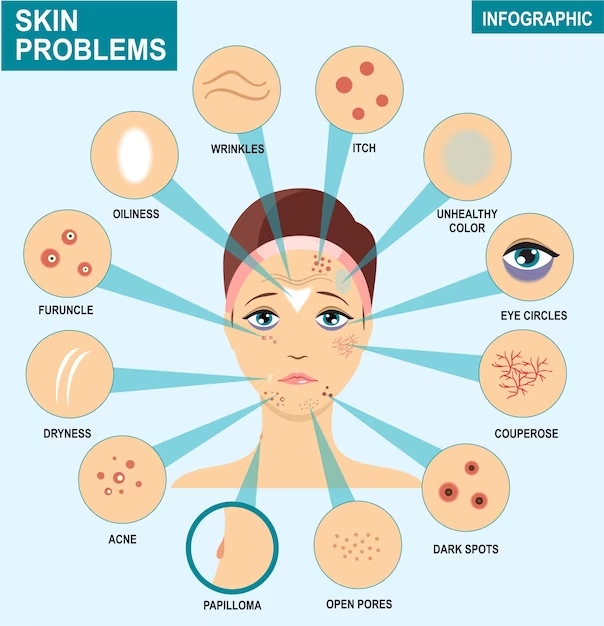The skin is the body’s largest organ and serves as a protective barrier against the external environment. It is not uncommon for individuals to experience various skin conditions throughout their lives.
These conditions can range from minor irritations to serious medical concerns. Identifying and treating different types of skin conditions is essential for maintaining healthy skin and overall well-being.
In this comprehensive guide, we will discuss some common skin conditions and their management.
Identifying Skin Conditions
Acne
Acne is a common skin condition characterized by the formation of pimples, blackheads, and whiteheads. It often occurs on the face, chest, and back.
Treatment
Over-the-counter topical treatments, prescription medications such as betnovate cream as well as tri luma cream and lifestyle modifications.
Eczema (Dermatitis)
Eczema is an inflammatory skin condition that causes red, itchy, and often scaly patches. It can appear anywhere on the body.
Treatment
Moisturizers, topical steroids, antihistamines, and lifestyle adjustments to avoid triggers.
Psoriasis
Psoriasis is an autoimmune skin disorder characterized by red, scaly patches of skin. It can affect various body parts, including the elbows, knees, and scalp.
Treatment
Topical creams, phototherapy, and systemic medications.
Rosacea
Rosacea leads to redness and visible blood vessels, often on the face. It may be accompanied by pustules and eye irritation.
Treatment
Topical antibiotics, oral medications, and laser therapy.
Skin Cancer
Skin cancer can manifest in various ways, such as moles that change in size, shape, or color. Early detection and treatment are crucial.
Treatment
Surgical removal, radiation therapy, chemotherapy, or immunotherapy.
Fungal Infections
Fungal infections, like ringworm and athlete’s foot, present as itchy, scaly rashes. They can occur on different areas of the body.
Treatment
Antifungal creams, powders, or oral medications.
Hives (Urticaria)
Hives are raised, itchy welts on the skin that can appear suddenly. They are often triggered by allergies or stress.
Treatment
Antihistamines, avoiding triggers, and stress management.
Cold Sores (Herpes Simplex)
Cold sores are small, painful blisters that typically appear around the mouth or on the lips. They are caused by the herpes simplex virus.
Treatment
Antiviral medications and topical creams.
Contact Dermatitis
Contact dermatitis results from skin contact with irritants or allergens. It can lead to redness, itching, and rash at the site of contact.
Treatment
Avoidance of triggers, topical steroids, and antihistamines.
Treating Skin Conditions
Treatment for skin conditions varies depending on the specific condition, its severity, and individual factors. Here are some general guidelines for treating skin conditions:
Maintain Good Skin Hygiene
Keep your skin clean and moisturized. Use a mild, fragrance-free cleanser and apply moisturizer regularly.
Avoid Triggers
Identify and avoid factors that exacerbate your skin condition. This may include specific foods, environmental allergens, or certain skincare products.
Topical Treatments
Many skin conditions can be managed with topical treatments like creams, ointments, and gels. These may include corticosteroids, antibiotics, or antifungal agents.
Oral Medications
In some cases, oral medications are necessary, such as antibiotics, antivirals, or antihistamines.
Lifestyle Adjustments
Lifestyle changes, like stress management, a healthy diet, and regular exercise, can have a positive impact on skin health.
Phototherapy
Phototherapy involves exposure to ultraviolet (UV) light and can be effective for certain skin conditions like psoriasis.
Surgical Procedures
Skin conditions like skin cancer often require surgical interventions for removal.
Preventive Measures
Protect your skin from the sun by using sunscreen and wearing protective clothing to reduce the risk of skin cancer.
Consult a Dermatologist
If your skin condition persists, worsens, or if you are uncertain about its nature, consult a dermatologist for a professional evaluation and personalized treatment plan.
Conclusion
Skin conditions can affect individuals of all ages and backgrounds. Identifying and treating these conditions is crucial for maintaining healthy skin and overall well-being. By understanding the common skin conditions and their respective treatments, you can take steps to alleviate discomfort, improve your skin’s appearance, and, in some cases, prevent serious health complications.
Remember that every person’s skin is unique, and what works for one individual may not work for another, so consulting a healthcare professional is often the best approach to manage and treat skin conditions effectively.


